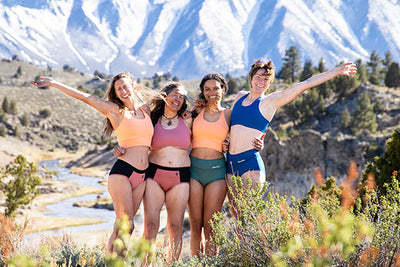Têra Kaia Sustainable Production Standards
Here at TK we carefully and critically analyze our production partners to ensure our supply chain is sustainable and ethical. To work with Têra Kaia we require one or multiple of the below certifications which provide a variety of assurances; ethical labor, safe working conditions, no unnecessary harm to the environment during the textile dying process.
Certifications
As we transition into 2021 all future TK production partners must meet one or more of the standards below.
Environmental Certifications
Thousands of chemicals go into the creation of textiles with some of them being extremely hazardous to humans and the environment. Environmental certifications ensure accountability during the fabric creation phase of basewear.
1. Bluesign
The bluesign® system takes into account the use of energy, water, chemistry, emissions and worker safety during fabric production. Specifically, the bluesign® system monitors efficient use of resources during the “Dyeing and Finishing Process” of fabric production.
2. OEKO-TEX
OEKO-TEX is a worldwide consistent, independent testing and certification system that assures no harmful chemicals or toxins were used from fiber-to-finished garment.
3. The Global Organic Textile Standard (GOTS)
The Global Organic Textile Standard (GOTS) is the worldwide leading textile processing standard for organic fibers, including ecological and social criteria, backed up by independent certification of the entire textile supply chain.
4. Global Recycle Standard (GRS)
GRS is an international, voluntary, full product standard that sets requirements for third-party certification of Recycled Content, chain of custody, social and environmental practices, and chemical restrictions. (Textile Exchange) It checks wether a product has the recycled content it claims to have.
Social Certifications
Social certifications are important for monitoring and maintaining an ethical working environment. The below certs ensure that the facilities creating Basewear is providing their laborers with fair pay, safe working conditions, reasonable hours, and benefits.
1. Wrap (Worldwide Responsible Accredited Production)
WRAP certification is recognized around the world as proof of social compliance in the apparel industry. Wrap only certifies individual production units, allowing auditors to get an "on the ground" perspective of each facility's operations to ensure that they are maintaining compliant practices. All certifications require periodic renewal depending on the level, and all certified facilities are subject to unannounced follow-up visits during their certification periods.
2. SA8000
The SA8000 Standard is the world’s leading social certification program. The SA8000 Standard and Certification System provide a framework for organizations of all types, in any industry, and in any country to conduct business in a way that is fair and decent for workers and to demonstrate their adherence to the highest social standards. Created by SAI in 1997 as the first credible social certification, it has led the industry for over 20 years.3. The Fair Labor Association (FLA)
FLA is a collaborative effort of universities, civil society organizations and socially responsible companies dedicated to protecting workers’ rights around the world. It is an international organization with their headquarters in Washington, DC, and offices in China, and Switzerland.FLA reminds companies to voluntarily meet internationally recognized labor standards wherever their products are made.
4. Fairtrade Certified
Fairtrade is an independent, third-party certification organization that works with nearly 2 million farmers and workers in the Global South to secure decent working conditions, fair prices and better terms of trade so that producers can thrive and live sustainably.
Materials
In order to create basewear we need material that can stretch such as polyester, spandex and nylon. Because these materials are synthetic based petroleum materials, made from non-renewable resources we make an effort to work with mills that produce fabrics with a recycled form of these materials.
Disclaimer: We are working on transitioning our products to recycled fabrics. Please be patient as we transition our current production towards this new standard. Stay tuned to production in 2021 as we switch all of our textiles to recycled fibers created at mills that meet these standards below.
Synthetic
1. ECONYL
Econyl is regenerated nylon. Nylon waste, such as fishing nets that can no longer be used, or textile production scraps normally destined for disposal, are recovered and transformed into a new yarn, having the same characteristics as nylon made of virgin raw material.
2. REPREVE
Repreve is the world's number one brand of recycled performance fiber. Made from 100% recycled materials, including post-consumer plastic bottles and pre-consumer waste. They are also certified and traceable.

